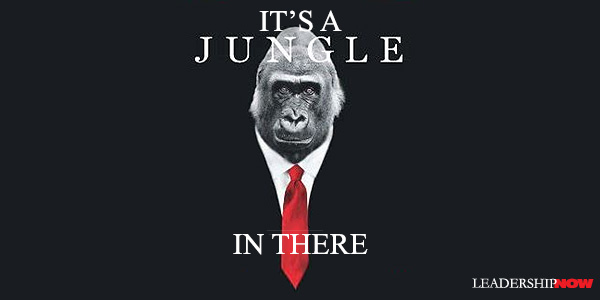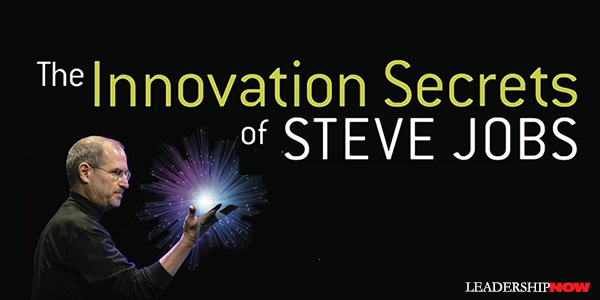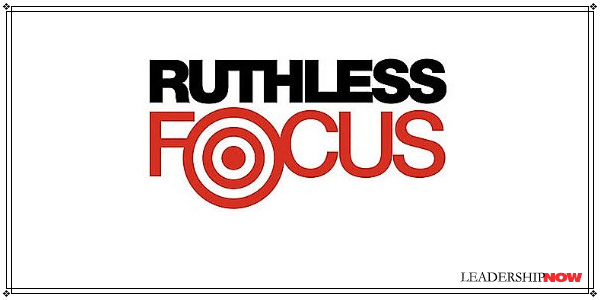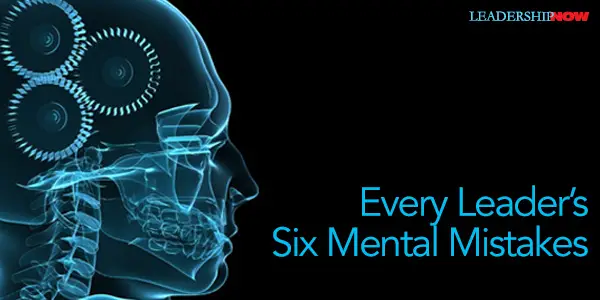 Leading Blog | Posts by Month |
 Leading Blog | Posts by Month |
10.31.10

LeadershipNow 140: October 2010 Compilation
Posted by Michael McKinney at 01:28 PM
10.29.10

It’s a Jungle in There
ANYONE that has ever been to the Rainforest Café, knows it's a treat. Created by Steven Schussler, the Rainforest Café holds the record as one of the top-grossing restaurant chains in the world and was the first restaurant concept to be featured at every Disney theme park worldwide. Schussler shares in It’s a Jungle in There, what it takes to make it happen and the lessons he learned that can be applied to your dream. Schussler embodies the five Ps of successful entrepreneurship—Personality, Product, Persistence, People, and Philanthropy—that he teaches in the book. He writes, “As a leadership quality, one’s own passion is what galvanizes others into action.” Passion and persistence has played a big part in everything Schussler has done. It’s “not going through the motions but going through with the emotions.”
“In the bedroom, my bed was constructed to look like it was suspended in a tree….Birds and animals moved freely through the area during showings of the house….Every room, every closet, every hallway of my house was a ‘scene’: an attempt to present my idea of what a rainforest restaurant would look like in actual operation….No venture capitalists were going to invest their money in my far-out concept without actually seeing it, so I transformed my house into my vision of what a rainforest restaurant would look like in order to make them believe in my dream.” Naturally, this would catch the attention of your neighbors (and law enforcement) too. There were problems of all sorts as you can imagine. And Schussler writes, “Being passionate doesn’t totally shield you from moments of doubt.” But his passion finally won out. How far are you willing to go to see your dream realized? In short, high-content chapters, he explains his guiding philosophy and backs them with concrete experiences. He has two quotes framed on the wall over his desk: “When you’re out of quality, you’re out of business” and “The noblest search is the search for excellence.” He talks about looking for “enhancement gaps.” Those gaps between “what you are seeing and what you could create to make what you are seeing better by providing some product or service.” He asks, “Are you willing to help other people succeed even when it’s not a requirement of your job to be of assistance?” Self-control: “What you don’t want to do is say things and/or act in a manner that will create negative impressions and the unwanted consequences that are certain to follow.” You must know your audience. Burning Bridges/Writing People Off: Don’t do it. “What I learned that day reconfirmed my belief that ego can be a killer, especially an unchecked ego. Most entrepreneurs need to have a healthy ego, but you also have to be realistic. That’s a very delicate balance—the kind of balance you need to cross a bridge you tumbled off the first time around.” Anyone would benefit by reading and integrating the lessons offered here. 
Posted by Michael McKinney at 03:13 PM
10.26.10

quickpoint: Work With the Willing! Unfortunately, in any given office, 20 percent of workers live in a permanent state of resistance. Everyone knows who they are. They walk around looking pained and miserable because their worldview is that the universe is unsafe and that everyone is out to get them. They bring their poor or ambivalent attitude to every task. They get upset if you ask them to move their desks; they get upset if you change their job descriptions; offer them chocolate ice cream and you can bet they would have preferred vanilla. They’re your toughest cases. At their worst, they can be bullies. (Is there someone that works under you that you are a little afraid of? Someone you spend a lot of time trying to avoid, or whose name comes up at your dinner table more often than you would like? That’s who I mean.) At best, they’re inaccessible to you: impervious to criticism and encouragement alike, and too complacent to find another job, they present a real leadership challenge. Unfortunately, in any given office, 20 percent of workers live in a permanent state of resistance. Everyone knows who they are. They walk around looking pained and miserable because their worldview is that the universe is unsafe and that everyone is out to get them. They bring their poor or ambivalent attitude to every task. They get upset if you ask them to move their desks; they get upset if you change their job descriptions; offer them chocolate ice cream and you can bet they would have preferred vanilla. They’re your toughest cases. At their worst, they can be bullies. (Is there someone that works under you that you are a little afraid of? Someone you spend a lot of time trying to avoid, or whose name comes up at your dinner table more often than you would like? That’s who I mean.) At best, they’re inaccessible to you: impervious to criticism and encouragement alike, and too complacent to find another job, they present a real leadership challenge.
Your best performers deserve a disproportionate share of your time and attention, so put aside any anxiety you might have over playing favorites in the office. Work with the willing. (Adapted from: Reality-Based Leadership by Cy Wakemen)
Posted by Michael McKinney at 06:17 PM
10.25.10

5 Leadership Lessons: Learning to Avoid the Contribution Syndrome He takes to task six traditional management practices that he believes are no longer suited to today’s business world. He argues: Strategic plans are of little use in times of great uncertainty and volatility; Operating plans and budgets provide a false sense of security; Management reporting is driven by an obsolete view of the world; Incentive compensation rewards poor performance and penalizes outstanding performance; Investments in staff education have been inadequate and misdirected; and Technology has failed to improve and in many cases has reduced the effectiveness of management. In one section he asks, “What makes a successful leader?” From his experience he concludes that the most successful ones share one characteristic—they ask great questions. He observes:
Posted by Michael McKinney at 11:14 PM
10.21.10

Harvey Mackay on Managing Your Career
You can't control the change swirling around you but you can control how you experience it. Harvey Mackay offers this advice on getting the job you want: • Be prepared Regardless of the economy, there is nowhere you can hide that's guaranteed earthquake-proof against your own personal recession. The day can come when you step into your boss's or banker's office some Friday afternoon and hear, "I'm sorry to have to tell you this, but..." It's not going to be easy, no matter how well prepared you are. But it's going to be a lot harder if you're like the 90 percent of us who aren't prepared when the bomb falls. And it can happen to anyone, anytime. • If you reach for the stars, at least you'll get off the ground Most important of all, you will survive. Trends have occurred that make some aspects of the economic situation better, not worse for employees and job seekers. Here are a few:
(Adapted from Sharkproof: Get the Job You Want, Keep the Job You Love...in Today's Frenzied Job Market by Harvey Mackay) Other Books of Interest: In an environment filled with noise, actions speak louder than words, Instead of staking out a fixed position on the organizational chart, you need skills in designing and participating on ad hoc teams. And you need a certain kind of leadership and followership, to succeed. You live and work in a different world. You need new thinking and skills to succeed.
Posted by Michael McKinney at 11:41 PM
10.20.10

The Innovation Secrets of Steve Jobs
WHAT IS innovation? Innovation is a new way of doing things that results in positive change. It makes life better. Innovation can be big or small, but the principles apply to many aspects of life. As such, The Innovation Secrets of Steve Jobs is more than just about innovation. It’s about principles that have guided Jobs throughout his life. Innovation is about thinking differently, making new connections, and making things better. Author Carmine Gallo offers not rules, systems, or steps to greater innovation, but inspiring principles that can be applied to your own situation to get you to think differently. The principles are:
Confidence is a key to innovation. Jobs told Stanford graduates, “Don’t let the noise of others’ opinions drown out your own inner voice.” “Most important,” writes Gallo, “how you think about yourself and your business will have the greatest impact on the creation of new ideas that will grow your business and improve the lives of your customers.” Gallo provides a lot of background on Jobs and, in doing so, has written an inspiring, down-to-earth book that will encourage you to imagine what you could do by thinking differently. 
Posted by Michael McKinney at 07:17 AM
10.19.10

quickpoint: The Trap of “Outside-In” Thinking To achieve an execution revolution, business leaders need to quit thinking only about solving the current problem, but, instead, think about how to build an organization that’s good at solving problems in general—building the capability that’s certain to help overcome an uncertain future. To achieve an execution revolution, business leaders need to quit thinking only about solving the current problem, but, instead, think about how to build an organization that’s good at solving problems in general—building the capability that’s certain to help overcome an uncertain future.
Today, television, books, magazines, newspapers, and the Internet keep us flooded with information about what’s going on in the world. We become preoccupied with what everyone else is doing, instead of focusing on what’s going on inside our organizations. Focusing outward makes us good at being reactive, rather than developing the ability to execute well. This is true both individually and organizationally. The Execution Revolution is in fact an internal revolution. A revolution focused on changing the way your organization functions on the inside. In other words, controlling the things we can, to be better prepared for the things we can’t. (Adapted from: Six Disciplines Execution Revolution: Solving the One Business Problem That Makes Solving All Other Problems Easier by Gary Harpst)
Posted by Michael McKinney at 12:08 AM
10.18.10

Ruthless Focus
IT’S TOO EASY to get distracted. And when we do, we begin to do things we never should do. We take advantage of “opportunities” that are inconsistent with who we are, accept clients that don’t allow us to build on our strengths, hire people that don’t fit with our values, and spend more time reacting to our environment than creating it. Thomas Hall was, for most of his career, an advertising man. He has spent a lot of time helping clients grow. From accounts of great business and his own firsthand experience, he and co-author Wally Bock have extracted, in Ruthless Focus, lessons for business success based on a ruthless focus on the why—the core strategy that drives everything you do—and a ruthless focus on business basics that create the possibility for growth. A ruthless focus ensures that every action, every day, moves you and the business forward. You need a clearly defined core business strategy. The authors explain and illustrate five basic strategies to use as models in your own situation:
Your strategy should answer two questions: How are you going to beat the competition? and How are you going to make money? Once defined, that strategy needs to define all of your actions. “Your core strategy is the strategy you cluster everything else around. You use the other strategies to supplement your core focus.” As they point out and their examples illustrate, you can use many strategies, but to be successful, you need a single core strategy and focus ruthlessly on achieving it. “Your core strategy is the way to achieve long-term competitive advantage and profitability.” Ruthless focus makes good sense, but the problem is we are always tempted to try something new. There are times when game-changing technologies or market conditions necessitate a change in strategy, but not as often as you would think. “When you’ve got something that’s working well, it rarely gets better if you try to change it fundamentally. The successful companies we studied are ruthless about staying with their basic strategy until it doesn’t work for them anymore. One reason may be that they think of strategy differently than most companies.” They add: Wal-Mart, Toyota, Enterprise, and Publix have all been in business for more than 50 years with the same strategy. They’ve all been through the ups and downs in the economy. Laws and regulations have changed. Successful companies have adjusted, but the adjustments were tactical or operational, not strategic. Your core strategy—your reason for existence—rarely, if ever, changes. Keep a ruthless focus. 
Posted by Michael McKinney at 12:13 AM
10.15.10

You Already Know How to Be Great
ONE OF the hardest things we will attempt to do is to act on what we already know to do. It’s that difficulty that lies behind much of our search for the next big thing; some way to get around or make easier that which we know we should be doing. It is never easy, but by applying some new thinking, we can get out of our own way. Alan Fine states in You Already Know How to Be Great, that performance improvement is most often an issue of reducing the interference that’s getting in the way of using the knowledge we already have. Fine says that we have to get right the three elements that facilitate the use of the knowledge we already have. They are: Faith: Our beliefs about ourselves and our beliefs about others. High performance is more likely when we believe that we can learn and do better. The absence of Faith could be described as insecurity. Fire: Our energy, passion, motivation, and commitment. High performance is more likely when we are excited about learning and doing. The absence of Fire could be described as indifference. Focus: What we pay attention to and how we pay attention to it. High performance is more likely when we pay attention in a way that will quiet our minds. The absence of Focus could be described as inconsistency. High performance happens when we “get rid of the interference that blocks these natural, inherent human gifts.” Focus is the most powerful tool for removing distractions and, thus, the “most effective way to release Faith and Fire.” If we “create a singular focus on one or more critical variables of the task, we’re far more likely to create the flow state that creates high performance.” More than instructing, Fine believes we would be better off looking to what is blocking Faith, Fire, and Focus in our organizations, performers, families, and teams. Unleashing these qualities facilitates the use of knowledge. As managers, leaders, coaches, or parents, we’re incredulous to think (or more likely, it never even occurs to us to think) that without our excessive instructing, regulating, controlling, directing, and intervening, people might actually be able to perform with greater confidence, more enthusiasm, and more effective focus. Fine introduces the GROW process as a way of creating focus. The process asks: “What is my Goal? What’s the Reality? What are my Options? What’s the best Way Forward? GROW increases Decision Velocity [the speed and accuracy with which we make decisions]. It helps reduce interference, clarify thinking, identify options, and chunk down the challenge into doable tasks. It unblocks Faith, Fire, and Focus and frees people to use the Knowledge they already have. As leaders, we tend to approach most situations by providing more information. We actually nourish the expectation that we are to be telling people what to do when we really need to be working to help them get what’s inside of them out. Fine calls this inside-out coaching. It’s less about providing more Knowledge and more about releasing the Faith, Fire, and Focus that's already there in the performer. It’s more Focus coaching than it is Knowledge coaching. “It’s easy for coaches to get blindsided by what they think people have to pay attention to—to get so focused on the task that they miss the window through which a person can actually pay attention.” “When leaders simply tell people what to do (which is often the case), the result is often a lack of engagement and accountability on the part of the employee and little or no performance improvement. One of the primary observable signs of an outside-in approach is people constantly asking managers, leaders, teachers, or parents what to do.” As a coach, the biggest challenge isn’t the performer; it’s your own interference. You Already Know How to Be Great is about coaching ourselves and others to remove the interference that is blocking performance. It is full of applications of inside-out coaching and the GROW process he advocates. As such, it is an indispensable book for coaches or leaders of all types.

Posted by Michael McKinney at 06:57 PM
10.13.10

Every Leader’s Six Mental Mistakes MANAGING OURSELVES is our biggest task as a leader. How well we manage ourselves determines the kind of leader we will be and the impact we will have.
MANAGING OURSELVES is our biggest task as a leader. How well we manage ourselves determines the kind of leader we will be and the impact we will have.
Adapting Jonathan Haidt’s metaphor of the rider and the elephant, Richard Daft presents the executive (the voice of reason) and the elephant (impulsive and emotional) metaphor to help us to learn how to help our inner executive manage our inner elephant as needed to behave according to our best intentions—to better manage oneself. One of the biggest problems we face as a result of our inner elephant’s tendency to distort reality. It’s one of the reasons we are so surprised when someone disagrees with us. Our internal elephant judges (our self and others), creates illusions (self-justification) and acts as our attorney (defends us and making us immune to reality). In The Executive and the Elephant, Daft points out that our inner judge “sees things from a selfish point of view and has little empathy and consideration toward others. It is hard to be optimistic and motivate people when your mind is critical of them.” The judge will also become our own worst critic—“the automatic voice of blame and criticism inside your head that points out how inadequate you are.” Daft poignantly asks: “Can you be an effective leader when your mind is constantly finding fault with you?” Daft illuminates some perceptual habits of the inner elephant that can get in the way of seeing the world accurately. Without a conscious effort to do otherwise, it is easy to fall prey to any or all of these six mental mistakes: Reacting Too Quickly. As quickly as things are thrown at us, it’s a lot easier being reactive than being proactive. It’s easy to instantly judge, conclude and react based on small scraps of data rather than slowing down and remaining calm says Daft. Serious intention is required to slow things down. How we see things always appears so clear to us and it seems we can’t act on it soon enough. It’s what the elephant does. We have to engage our inner executive to avoid acting on wrong-headed conclusions. Inflexible Thinking. The inner elephant doesn’t like to change its mind. After all, we believe what we think for obvious (to us) reasons. We don’t intentionally think the wrong thing. And we interpret the world around us according to our beliefs. “It is very hard to let go of your own gut feelings and mental preferences” says Daft. “It’s all you know. The mind-set, habits, and skills that made you successful tell you to stick to your guns. However, things change, and if the mind does not accept the current reality, it can create problems for everyone.” Wanting Control. Your inner elephant is more comfortable when you’re in control. Of course, we only take control because if we didn’t things wouldn’t get done the way we think they should be done. But our satisfaction is at their expense. The desire for control can lead us to illusions—attempts to gain control (and think we have it) over the uncontrollable. A leader’s inner executive needs to learn to give control to others. Our job is to “engage a bigger picture of mission and purpose (inner executive) and let people be in control of their own work.” Emotional Avoidance and Attraction. Even when we know we need to do something, our inner elephant can find reasons to avoid it. We procrastinate. We delay an intended course of action despite expecting to be worse off for the delay. Our inner elephant feels anxiety and creates an invisible barrier in our mind that prevents us from moving forward. Attraction can cause us problems by enslaving us to our desires. Desire for acceptance can cause to make decisions we wouldn’t otherwise make under the influence of our inner executive. About the desire for perfection, Daft writes: A few of my MBA students are perfectionists who can’t restrain their desire to redo a group project to make it look the way they want, even after I explain that this behavior is fatal for leaders who have to accomplish work through others. Managers may also feel the need to act on their unthinking desire to be right rather than let other people shine, to perpetually find fault with other people’s ideas, to win every disagreement, to blame others when something goes wrong despite being culpable, or to speak harshly when upset. Exaggerating the Future. Related to the emotional avoidance and attraction issues is our tendency to exaggerate outcomes. When our inner elephant wants to do something we tend to be overly optimistic about the future and underestimate the potential difficulties. When we don’t, we tend to overstate the potential problems. The problems are obvious. Objectivity is needed if we are to anticipate the future realistically. “The inner elephant tends toward positive or negative exaggerations about the future depending on its emotional orientation toward an object or event." Chasing the Wrong Gratification. The inner elephant is child-like and selfish. “Finding happiness is a challenge because the inner elephant often seeks things that do not provide lasting satisfaction.” We can be easily seduced into chasing after the wrongs things—things that don’t bring us lasting satisfaction. Daft offers sensible techniques to get some mastery over your inner elephant. He writes, “Let’s face it: Your inner elephant has been running your life. For better or worse, everyone is on automatic pilot more than they realize.” Your best defense is to get to know your inner elephant. Slow down and reflect. While there are negatives, there are strengths that can be harnessed. 
Posted by Michael McKinney at 11:33 PM
10.08.10

Newswire: David Gergen Interviews Robert M. Gates
Posted by Michael McKinney at 09:32 AM
10.06.10

What Do You Do and Say When You Believe What You Think is Right?Knowing right from wrong is one thing, but acting on it is something else. What is stopping us from acting on the values we feel strongly about?Making decisions based on your values is the right way to live. It is also true that conflicting values are a normal part of individual and organizational life. Learning to voice our values in a way that they will be heard becomes an important part of great leadership. Values, as distinct from morals and ethics, are those things that are important to you. Great leaders, at any level, preserve core values. But that’s not always easy to do for any number of reasons: We feel alone We wonder if we’re being naïve We wonder if we’re misinformed (and give in to rationalizations) We wonder if our boss will be receptive We anticipate that we will encounter resistance and we don’t want to be argumentative We worry about being ostracized or worse if we appear not to be a team player Any of these reasons are enough to make you keep your head down. But not speaking up can have large and often unseen repercussions not to mention the lack of emotional commitment we feel when we are not able to live our values. Speaking up can require a bit of finesse. Not everyone sees things the way we do or even if they do, they don’t see how the value applies. Giving Voice to Values by Mary Gentile, encourages us to think through our values. Most often the kinds of values conflicts that we will encounter are predictable and are of the “right versus right” variety opposed to “right versus wrong choices”—truth versus loyalty; individual versus community; short term versus long term; justice versus mercy. Although we can feel as though our hands are tied, people can and do voice their values successfully. If we can understand our own motivations and those of others, develop the emotional intelligence to identify and practice different approaches to voicing our values in changing contexts (without becoming self-righteous), and reflect on and practice verbalizing our values, we can increase the likelihood that we will voice our values effectively. Thinking through our values creates options for us to consider when we encounter conflict. Reflect on:
It is not easy to act on our values in an environment where it is not encouraged. But the first step is to live intentionally or we get caught in the moment and face the regret of saying nothing when something should have been said. Gentile recommends that we begin by asking—“What if we wanted to voice and act on our values? What would we say and do?”—out loud with colleagues and friends. When we do, “we not only generate scripts and skills for ourselves, but we invite others to be part of our process, building a set of allies who are engaged first simply by helping us to solve our problem, with no strings or commitments attached. But once we all work together to craft a response, the barriers begin to feel assailable and our confidence builds. ” We have seen the effects of the failure to make the right choices. Getting the right kinds of conversations started in the first place is often where people and organizations go wrong. Through Giving Voice to Values, Gentile is trying to raise awareness and give practical approaches to building the skills and courage necessary to know what to do when you know something is wrong. Giving voice to values is an ongoing skill-building endeavor. It takes—above all—practice.
Posted by Michael McKinney at 04:58 PM
10.04.10

quickpoint: Getting Out of the Way Think about this: Everyone has the potential to perform better Potential is blocked by interference Interference can be reduced by focused attention Focused attention can be simply and systematically increased Alan Fine writes in You Already Know How to Be Great, that most often dramatic performance improvement does not come from gaining new knowledge; it comes from getting rid of the “interference” that gets in the way of using the knowledge and capacity we already have. “When managers or leaders become so obsessed with policies, procedures, and their own ways of doing things” they can “become disconnected from results. They begin to micromanage. They divert employees’ attention away from learning and creating and toward trying to remember and comply. What an enormous loss of possibility!” How many times have we seen this (or even participated in it)? “We have to do it this way for the sake of order and consistency.” Really? And what are you sacrificing in the process? Probably far too much. What are we putting in the way of those we lead? Fine asks, “Was it possible that much of the specific technical instruction I’d been giving my students was not only not helping them but was actually getting in the way?” Additionally, in our own growth process, we can focus so much on the techniques, the lists, and the steps of leadership that we miss the essence of leadership. The relationships. What is getting in your way? Related Interest:
Posted by Michael McKinney at 06:55 AM
10.01.10

First Look: Leadership Books for October 2010Here's a look at some of the best leadership books to be released in October.




For bulk orders call 1-800-423-8273 NEW EDITIONS: Scott Eblin's The Next Level is now available in a second edition and contains a lot of new content such as new executive interviews, Coachable Moments, Data Points, an expanded Situations Solutions Guide and more to equip new and existing executive leaders.  Build your leadership library with these specials on over 160 titles. All titles are at least 40% off the list price and are available only in limited quantities.
Posted by Michael McKinney at 08:44 AM
|
BUILD YOUR KNOWLEDGE


How to Do Your Start-Up Right STRAIGHT TALK FOR START-UPS 
Grow Your Leadership Skills NEW AND UPCOMING LEADERSHIP BOOKS 
Leadership Minute BITE-SIZE CONCEPTS YOU CAN CHEW ON 
Classic Leadership Books BOOKS TO READ BEFORE YOU LEAD |
|